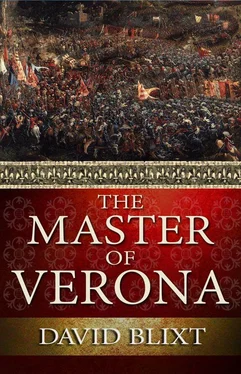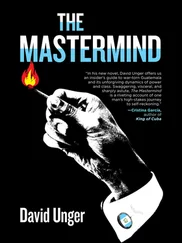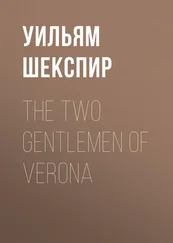David Blixt - The Master of Verona
Здесь есть возможность читать онлайн «David Blixt - The Master of Verona» весь текст электронной книги совершенно бесплатно (целиком полную версию без сокращений). В некоторых случаях можно слушать аудио, скачать через торрент в формате fb2 и присутствует краткое содержание. Год выпуска: 2012, Издательство: Sordelet Ink, Жанр: Исторические приключения, на английском языке. Описание произведения, (предисловие) а так же отзывы посетителей доступны на портале библиотеки ЛибКат.
- Название:The Master of Verona
- Автор:
- Издательство:Sordelet Ink
- Жанр:
- Год:2012
- ISBN:нет данных
- Рейтинг книги:5 / 5. Голосов: 1
-
Избранное:Добавить в избранное
- Отзывы:
-
Ваша оценка:
- 100
- 1
- 2
- 3
- 4
- 5
The Master of Verona: краткое содержание, описание и аннотация
Предлагаем к чтению аннотацию, описание, краткое содержание или предисловие (зависит от того, что написал сам автор книги «The Master of Verona»). Если вы не нашли необходимую информацию о книге — напишите в комментариях, мы постараемся отыскать её.
The Master of Verona — читать онлайн бесплатно полную книгу (весь текст) целиком
Ниже представлен текст книги, разбитый по страницам. Система сохранения места последней прочитанной страницы, позволяет с удобством читать онлайн бесплатно книгу «The Master of Verona», без необходимости каждый раз заново искать на чём Вы остановились. Поставьте закладку, и сможете в любой момент перейти на страницу, на которой закончили чтение.
Интервал:
Закладка:
But it was the actual paint that had Pietro's interest. "This is excellent work."
"It surely is," nodded Montecchio, looking close. "The neck of the stallion is just right, and also the length of the mane… Oh — sorry. My family breeds horses. These were painted by Giotto di Bondone." Pietro startled Mariotto with an abrupt laugh. "You've heard of him?"
"Better," said Pietro, "I know him! He's a friend of my father's. Sort of. We visited him often in Lucca." Pietro opened his mouth, then shut it, visibly resisting temptation.
Knowing he was missing something, Mariotto made an open gesture with his hands. "What?"
Pietro shook his head. "Have you ever seen Giotto's children? As sweet as can be, really nice. But they're repulsive. Girls as well as the boys. Ugly as sin. Well, we're eating supper in their house one night when my father asks how a man who paints such beautiful frescoes could make such ugly children."
"Oh dear God! What did Giotto say?"
Pietro did his best imitation of the cheery painter. "'My dear fellow, I do all my painting by daylight.'"
Smothering their laughter, they entered the salon.
Somewhere near Torre di Confine, a lone rider reined in before an inn. Young and frantic-looking, he leapt from his sweat-streaked horse and called for a fresh one. A stable boy emerged from beside the inn, hunk of cheese in hand. At the same moment the inn's proprietor, a burly man with one arm, sauntered out the door.
"Need — a horse," said the young rider.
The stable boy looked on, bored, as his master gave first the youth then his horse an appraising look.
"No," he said over his shoulder. "No horse for him. To judge by this one, he'll kill it."
The breathless rider clutched the innkeeper's one arm, gasping as he gave his news. At the same moment he spilled his purse at the innkeeper's feet.
Whether it was the news or the gold, the innkeeper changed his tune at once. The rider was brought some stout ale while the inn's best horse was saddled. The young messenger shivered the whole time, looking as though he were about to weep. He was certain he'd barely escaped with his life, and was equally sure that each moment of delay brought a whole army in his wake.
In ten minutes he was on the road again, a fresh wineskin hanging from his belt, digging his heels harder and harder into the new horse, leaving the innkeeper to call his neighbours together to decide if they should flee.
Sunlight spilled in through billowing curtains of the arched loggia to frame the lord of Verona and his honoured guests. The open side of the long covered balcony faced east, providing a magnificent view of the Adige River.
It was not, however, the view one first noticed upon entering. Cangrande della Scala would stand out in any gathering. His chestnut hair was sun-bleached a dark gold and hung to frame his muscular jaw. Well over six feet tall, practically a giant, he possessed enormous energy. Even in repose his movements were crisp and economical. As much hawk as hound , thought Pietro.
Both kinds of animals were scattered among the crowd. A fraction of Cangrande's hawk collection was here, at ease on wooden stands that bore the marks of their pounces. Several guests were attempting to feed the blindfolded birds without losing fingers.
At the Capitano's feet were a pair of wolfhounds. Huge, with long narrow faces, they looked the most feral of creatures until Cangrande reached out a hand, whereupon they became puppies, craving attention from their master.
One dog lay before them in the position of dominance. This was a fine, wiry greyhound with the characteristic long face and curved teeth. Cangrande tossed him a little something, and he fetched it back quick as a wink. As he settled in again to gnaw at it at his master's feet, Pietro saw his back-cloth was embroidered with the silver ladder and imperial eagle — the della Scala family crest. Under the cloth the beast's fur was long and slightly matted, showing it was one of the tougher breed of that dog known as the veltro — a term also synonymous with bastard . For those who called Cangrande 'Il Veltro', there was always that extra, amusing, connotation.
Seated in the place of honour to the Capitano's left was Pietro's father. Born Durante Alighieri di Fiorenza, he was now known to the cultured world as the poet Dante. A head and a half shorter than the young lord of Verona, he suffered mightily in comparison. His movements were jerky and incomplete, his breathing audible. His frame was mostly hidden beneath a gonella , the comfortable long gown favored by scholars, and his head was covered by the hooded cappuccio . Both garments were of black and scarlet, expensively dour colours. Like Pietro, Dante possessed a patrician face with an aquiline nose and large eyes. His jaw was large too, and the lower lip protruded a bit past the upper. But unlike his brown-haired son, his hair and beard were thick, black, and shiny.
As Mariotto and Pietro stood in the doorway of the loggia, servants rushed over to wash their hands. Watching them approach, Pietro saw the need for the slippers. The palace floor was not covered in the usual straw rushes, but bare marble. Great care was taken to keep mud and filth outside. The dogs must drive the servants insane , thought Pietro.
As the servants tended to them, Mariotto whispered, "There, in the deep green, that's Passerino Bonaccolsi, Podestà of Mantua — it's said he's Cangrande's best friend, but there's politics there, so you never know. Next to him, in the fur, that's Guglielmo da Castelbarco-Stick-in-the-Mud. He recently became the armourer for our army, and makes a nice bit of money from it. The one playing with the bread knife is Federigo della Scala — a remote cousin. He's a little quiet, but he defended the city brilliantly this summer. And there, standing just behind the Capitano, is Nicolo da Lozzo, but Cangrande just calls him Nico. He's young, only a little older than the Capitano, and he's the army's second-in-command. The post was given to him as a reward for deserting Padua, and he's doing very well with it…" Mariotto continued naming all the powerful men gathered in this room. Pietro took in each one with interest, though he doubted he'd remember many names. Bonaccolsi he'd heard of, and da Lozzo. For the rest, some of the surnames were familiar. Those denied the regal daybeds either stood or sat on cushioned boxes and stools.
Mariotto paused, looking at a broad-shouldered man with long hair braided at the back of his head. The deep blue of the ribbon that held the braid distracted the eye from the traces of silver and white that were mixed with the black and deep brown. Pointing to him, Mariotto said, "I don't know who that is."
Pietro was pleased to know something his companion did not. "That's Uguccione della Faggiuola, my father's current patron. He brought us here to renew father's introduction to the Scaliger — though I think he wants to use us to impress Cangrande. He needs an ally in the north."
Looking wise, Mariotto nodded. "Ah."
"He also bought me my old hat."
Mariotto grinned. Uguccione looked up and gave Dante's son a cheerful nod. Pietro was in the midst of waving back when a prickling sensation crept up his spine. Eyes traveling a few feet beyond the Pisan lord, he saw his father's gaze fixed upon him. A muscle below the poet's left eye twitched as his eyes flickered up a fraction to take in the new hat. Pietro felt his blood drain to his knees.
Dante and Cangrande were debating with a young abbot, a bishop whose aged gonella swept the floor, and a midget with a wide nose and dark skin. This last was dressed extravagantly, with bells on his cuffs in an outlandish parody of style. Moving closer, Pietro strained to filter out the overlapping conversations along the loggia to hear the discussion.
Читать дальшеИнтервал:
Закладка:
Похожие книги на «The Master of Verona»
Представляем Вашему вниманию похожие книги на «The Master of Verona» списком для выбора. Мы отобрали схожую по названию и смыслу литературу в надежде предоставить читателям больше вариантов отыскать новые, интересные, ещё непрочитанные произведения.
Обсуждение, отзывы о книге «The Master of Verona» и просто собственные мнения читателей. Оставьте ваши комментарии, напишите, что Вы думаете о произведении, его смысле или главных героях. Укажите что конкретно понравилось, а что нет, и почему Вы так считаете.












